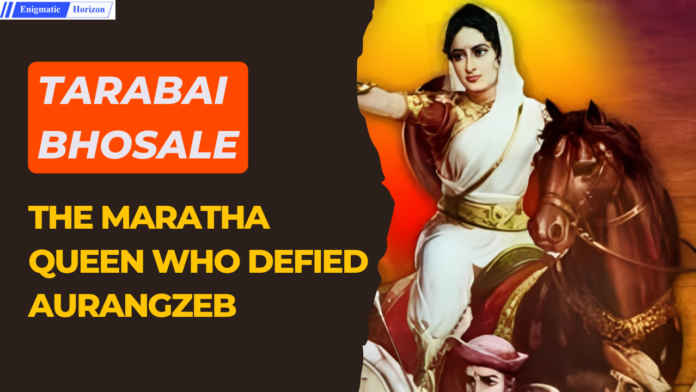Priyal Dholakia (Assistant Editor)
“Strike fear into their hearts, for we are the guardians of our empire’s glory!”
These powerful words echoed through the battlefields as the remarkable Maratha queen, Tarabai Bhosale, rose to power during the empire’s darkest days. In a time when the Maratha Empire stood on the brink of collapse, Tarabai Bhosale fearlessly led her people to victory against Aurangzeb. She defied all odds and left an indelible mark on Indian history. Unfortunately, the stories of such valiant rulers often fade with time, making it imperative for us to revive their legends and cherish their extraordinary contributions.
The Rise of The Warrior Queen
Born in 1675 in Maharashtra, Tarabai Bhosale belonged to a lineage of great warriors. She was married to Rajaram Bhosale, the brave son of Chhatrapati Shivaji Maharaj. Tragically, Rajaram’s reign was short-lived, as he passed away soon after, leaving Tarabai as the sole regent of the state. At this point, the Maratha empire was facing its lowest ebb. Danger loomed large from all sides, and hope seemed to dwindle. It was at this critical juncture that Tarabai’s true mettle shined through as she took charge of the mighty kingdom at its lowest point.
The Resistance Against Aurangzeb For Seven Years
Times were beginning to get turbulent for the Maratha state. Aurangzeb, the Mughal emperor, was seeking to expand his dominion over the land and bring the Maratha Empire under his control. With his vast army and resources, he posed a formidable threat to the Maratha forces. At a time when defeat seemed imminent, Tarabai rallied her troops and instilled a renewed sense of purpose among her people. She invoked the spirit of her ancestors and surged ahead to take on the Mughal army with all her might.
Under Tarabai’s leadership, the Marathas fiercely resisted Aurangzeb’s advances. Despite being outnumbered and outmatched, Tarabai refused to bow down. She employed guerrilla tactics and used the terrain to her advantage to exploit Aurangzeb’s weaknesses. Her tactical brilliance allowed the Maratha forces to hold their ground and give a challenging fight to the Mughal dominion for seven long years. With her astute leadership skills and military prowess, she led the Maratha army to a resounding victory in their name.
Today, Tarabai stands strong as a symbol of courage and valour, not just for the Maratha culture but for India as a whole. Despite encountering overwhelming odds, she stood tall and defied every challenge that came her way. Her relentless battle against the Mughal forces for seven long years stands as a true testament to the bravery and spirit of Indian warriors.
Erosion of Historical Narratives and Need for Revival
Tarabai emerged as a true beacon of hope, bravery, and resilience against painstakingly high odds. With her steadfast resolve, she became a glowing symbol of the true values and spirit of the Maratha culture.
However, over time, the tales of such brave warriors as Tarabai Bhosale have gradually begun to fade into obscurity. Though regional folklore and culture continue to celebrate their legends, there is a need to revive their stories for a larger section of society so that the current generation of people, especially the youth, who often repel Indian culture, get acquainted with the cultural richness of our land. The shifting tides of history often overlook the contributions of such valiant warriors, leading to the erosion of their narratives. It is our responsibility to bridge this gap and bring these forgotten legends back to life.
By reviving the stories of warriors like Tarabai Bhosale, we should honour their unwavering spirit and pay tribute to their remarkable achievements. Their struggles, victories, and sacrifices serve as a source of inspiration for generations to come. It is our duty to keep them alive, ensuring that their valour is never forgotten.
